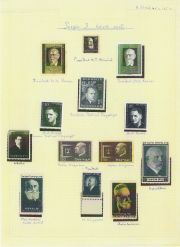« Prev. Page: Engaged, but ....
Next Page: ... Author and Poet »
Hans Margulies (1889-1960)
Journalist, ...
1918-1922: Schriftsteller und Journalist in Wien.
1918-1922: Author and Journalist in Vienna[1]
After his war services, Hans moved to Vienna (moved back to Vienna ?), where he lived as a freelance journalist, publishing articles in many newspapers in Vienna and Budapest. He also wrote poems which were published in several anthologies and newspapers.
1922 – 11th. March 1938: Editorial journalist for the viennese daily newspaper „Der Wiener Tag“, from 1923 – 1927 also an editor for the viennese daily newspaper „Die Stunde“. Head of the section „Court News“. According to general expert opinion, this section was the best lead column of this kind in the viennese daily newspapers and achieved an importance that it had never had before. The editors of my newspapers sent me, as the only austrian journalist, to a series of important international trials, – e.g. in Berlin, Düsseldorf, Lemberg, Paris, Chur, etc. I have repeatedly written articles which were critical of the Judiciary and taken part in the struggle between Right and Law. I can rightfully claim, that my work has successfully helped innocent people (e.g. in the well-known case of Pruscha), and furthermore, that my work has influenced law-making and it's application towards more humanity. [1]
[He] became prominent especially through socially critical courtroom reporting: reported several spectacular cases in the interest of preventing or reversing miscarriages of justice. Contibutor to Berliner Tageblatt, Frankfurter Zeitung, Die Weltbühne and others.[2]
It was due to his work that the severe penalties for abortion were reduced.
Another famous case was that of Philipp Halsmann
Margulies hat sich nach einigen Jahren als Gerichtsberichterstatter einen guten Namen gemacht. Er hat einen rühmenswerten Anteil gehabt an der Revision des Urteils im skandalösen Vatermord-Prozeß in Tirol gegen den später berühmt gewordenen Photographen Halsmann.[3]Halsmann was accused of murdering his father. Many believed he was wrongly imprisoned and Hans was influential in having him released. PH is now (1960) a famous photographer in New York.
As a court reporter who was also interested in photography, he made (had made ?) a briefcase with a built-in camera. In this way he could smuggle his camera into the courtrooms and take illicit pictures.
Political reporting: 'Elections in France 1924', Plebiscite in Upper Silesia', 'Carpathian Russia', 'Bulgaria', etc; Many political interviews, eg. with Painlevé, Herriot, Moutet;
Other achievments during these years, have been:
Many editorials;
Regular articles on cultural political themes;
Over a period of 10 years, I wrote, mostly single-handed, the literary section (book reviews);[1]
In the last months I introduced and wrote philatelic columns for the newspaper;[1]
He was an expert, well known philatelist.
One of his stamp collections had the theme
People I have known.
These included:
Dr. Karl Renner, President of Austria
Hainish, President of Austria
Bertolt Brecht, German Poet and Playwright
Dr. Chaim Weizmann, President of Israel
Bodenheimer
Anton Wildgans, Austrian Poet and Playwright
Sokolar
Max Nordau, Writer and Zionist
Theatre and film reviews;
Feuilletons, reporting, etc. [1]
Alongside all of this were the contributions to leading german newspapers, e.g. the Berliner Tageblatt, Frankfurter Zeitung, Dortmunder Generalanzeiger, Prager Presse, Prager Tageblatt, und die Weltbühne, Berlin.
I was also the viennese representative for the Frankfurter Illustrierte Zeitung, for which I produced many large photo reports.[1]
After so many years in and around the theatre, the newspapers, cabaret, etc, Hans must have met most of the personalities of the time:
References: every viennese journalist and newspaper reader, every viennese lawyer, judge and justice employee;His mention of Joseph Roth is interesting, in view of the (possible) engagement to Freiderike Reichel in the early 1920's. See : Engaged, but ... .
Furthermore: Dr. Stefan Zweig, Arnold Höllriegel, Rudolf Olden, Dr. Arthur Rundt, Leopold Schwarzschild, Berthold Viertel, Theodor Wolf, Robert Neumann, Benno Reiffenberg, Joseph Roth, Hermann Broch.[1]
Snippets:
In 1922 he had his appartment decorated by the architect Margarete Schuette-Lihotzky:
In 1922 he had his appartment decorated by the architect Margarete Schuette-Lihotzky:
"in 1922-23, she designed the interior of an apartment for the writer Hans Margulies ..."
www.austria.org (the original Internet source - it doesn't show this information anymore.)
Margarete Schütte-Lihotzky (January 23, 1897-January 18, 2000) was the first female Austrian architect and an activist in the Nazi resistance movement. She is mostly remembered today for designing the so-called "Frankfurt Kitchen", a prototype of today's built-in kitchens. Wikipedia: Margarete Schütte-Lihotzky
Other sources:
- Hans Margulies, CV, 1938(?)
- International Biographical Dictionary of Central European Emigrés 1933-1945; K. G. Sauer Verlag, München, 1983
« Prev. Page: Engaged, but ....
Next Page: ... Author and Poet »
